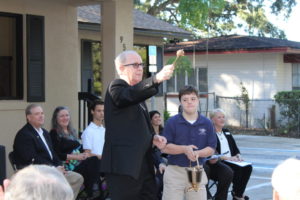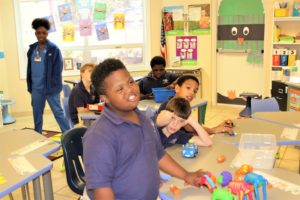When people learn Robert Breske is the father of a teenager with Down syndrome, they sometimes tell him they’re sorry. That isn’t what he wants to hear. He’ll tell them children like his soon-to-be-15-year-old son, Bobby, have changed his life — and the world — for the better.
“They are closest things to God,” he said during an event earlier this month at Orlando’s Morning Star Catholic School, a faith-based special education center Bobby attends. “They are that way all through their whole lives.”

In recent decades, advances in medicine and early intervention programs have made their lives richer and longer than ever. And that has created a new set of questions for parents like Breske, whose special-needs children will need to prepare for life as adults.
Public policy is starting to adapt. Recent federal legislation created savings accounts that can help adults with special needs pay their living expenses. New Florida laws promote college and career-training programs. And schools, both public and private, have expanded programs aimed at preparing students like Bobby to get part-time jobs and care for themselves.
The elder Breske was helping unveil a renovated house at Morning Star. The structure once housed nuns on the 56-year-old school site, but it’s been converted to help students in its young-adult transition program learn how to cook, clean and live independently. Recent changes to Florida educational choice programs mean similar programs could soon be growing at private schools around the state.
“We all know we’re going to away one day,” Breske said, describing the anxiety many parents feel as their special needs children grow older. “And what’s going to happen to them?”
Camille Gardiner, who also has a son with Down syndrome, said parents like her were less likely to face that question a generation ago. In the 1970s, children born with Down syndrome were only expected to live into their 20s. Now, their life expectancy is about 60. As a devout Catholic, she said, “I have come to realize that being pro-life does not end at the birth of a child. In many ways, that’s where it starts.”
Gardiner’s husband, Andy, served as president of the state Senate until last month. He helped pass a range of new laws aimed at supporting families with special needs children, including a new educational choice program for which his family now serves as a namesake. (Step Up For Students, which publishes this blog, helps administer the Gardiner scholarship program.)
For years, Florida’s public education system has expanded programs that help special-needs students as they grow older. Orange County Public Schools, the school district where Morning Star is located, offers multiple transition-to-work programs that help them learn skills that can help them get wage-earning jobs.

Private school choice programs are starting to catch up. This year, a new Florida law allows private schools to set up transition-to-work programs for special needs students who rely on McKay scholarships to pay their tuition.
The Morning Star school in Orlando educates 61 students. It has seven full-time and two part-time students enrolled in its transition program, where they learn daily living skills and spend time at places like Publix, learning what it will be like to hold a part-time job.
Nearly all of the school’s younger students rely on McKay or Gardiner scholarships. But Sandra Cooney, Morning Star’s principal, said students older than 22 typically can’t receive new scholarship funds, and their families usually have to pay tuition on their own.
“If it would go to 26 or 27, that would be fabulous,” she said. “I think we would be packed if people still had scholarship funds.”
Society has begun to recognize that, with a little extra support in young adulthood, people with special needs can live independently and contribute to society. And gradually, she said, policy and funding have begun to catch up.
Photo credits: Estefania Nuñez-Brady.


